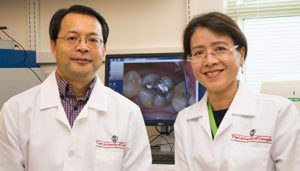Georgia now has the 19th highest adult obesity rate in the nation. Its adult obesity rate is currently 30.7 percent, up from 20.6 percent in 2000, according to The State of Obesity project. In addition, childhood obesity has been on the rise in Georgia with rural areas seeing the greatest impact. The University of Georgia College of Public Health is actively engaged in research and outreach aimed at combating obesity and promoting health and wellness across the state.
Statewide Outreach:
Georgia SHAPE
 Dr. Phillip Williams, dean of the UGA College of Public Health, serves on the Governor’s Advisory Council on Childhood Obesity, which provides advice and support to the Georgia Student Health and Physical Education (SHAPE) initiative. Spearheaded by Georgia Governor Nathan Deal, Georgia SHAPE is a statewide, multi-agency and multi-dimensional initiative that brings together governmental, philanthropic, academic and business communities to address childhood (0-18) obesity in Georgia. Other UGA public health faculty members involved in the initiative include Dr. Marsha Davis, associate dean of outreach and professor of health promotion and behavior, and Dr. Phaedra Corso, UGA Foundation Professor of Human Health and director of the UGA Economic Evaluation Research Group, who are working with the Georgia Department of Public Health to evaluate the impact of the policy. Over the next ten years Georgia SHAPE will work towards increasing the number of students in the Healthy Fitness Zone for Body Mass Index by ten percent. Other objectives set forth by the Governor and Georgia SHAPE include reaching disparate populations, increasing the aerobic capacity measure of Georgia’s youth, increasing the breast-feeding rate across Georgia, and increasing the number of early care centers that excel in nutrition and physical activity measures.
Dr. Phillip Williams, dean of the UGA College of Public Health, serves on the Governor’s Advisory Council on Childhood Obesity, which provides advice and support to the Georgia Student Health and Physical Education (SHAPE) initiative. Spearheaded by Georgia Governor Nathan Deal, Georgia SHAPE is a statewide, multi-agency and multi-dimensional initiative that brings together governmental, philanthropic, academic and business communities to address childhood (0-18) obesity in Georgia. Other UGA public health faculty members involved in the initiative include Dr. Marsha Davis, associate dean of outreach and professor of health promotion and behavior, and Dr. Phaedra Corso, UGA Foundation Professor of Human Health and director of the UGA Economic Evaluation Research Group, who are working with the Georgia Department of Public Health to evaluate the impact of the policy. Over the next ten years Georgia SHAPE will work towards increasing the number of students in the Healthy Fitness Zone for Body Mass Index by ten percent. Other objectives set forth by the Governor and Georgia SHAPE include reaching disparate populations, increasing the aerobic capacity measure of Georgia’s youth, increasing the breast-feeding rate across Georgia, and increasing the number of early care centers that excel in nutrition and physical activity measures.
Community-Based Outreach:
Healthier Together Calhoun – Healthier Together Taliaferro
The University of Georgia is working with community leaders and stakeholders to boost obesity prevention efforts in two rural Georgia counties—Calhoun and Taliaferro – where adult obesity prevalence is over 40 percent. The projects, called Healthier Together Calhoun and Healthier Together Taliaferro, are led by the UGA College of Public Health and UGA Cooperative Extension, an outreach unit of the university supported by specialists in the College of Agricultural and Environmental Sciences and the College of Family and Consumer Sciences. Additional partners include UGA’s J.W. Fanning Institute for Leadership Development, a public service and outreach unit; local, district and state UGA Extension offices; local community organizations; and local, district and state public health departments. The primary goal of these projects is to implement environmental changes to promote healthy eating and physical activity in places where children, youth and families spend their time. Proposed interventions involve working with schools, community organizations, local government and businesses to serve healthy food, sell healthy food, and create places to be physically active. This effort is funded by a two-year, $1.25 million grant from the Centers for Disease Control and Prevention.
Children as Change Agents – Colquitt County Action Pack Families
 Research has shown that children can be successful “change agents” and health messengers for healthy eating and physical activity in their families and schools. In 2012, Dr. Marsha Davis, associate dean of outreach and professor of health promotion and behavior, was awarded a $2.5 million grant from the United States Department of Agriculture National Institute of Food and Agriculture to support a five-year community-based childhood obesity program in Colquitt County, Georgia. The program, called Action Pack Families, has worked with third-graders from 10 elementary schools to implement an obesity-prevention program that includes their families, their teachers and the community. School curriculum sessions are aimed at increasing children’s knowledge and motivation for healthy eating and physical activity, increasing skills for being a health messenger to the home and community, and providing opportunities to engage in physical activity and eat healthy food during the school day. Monthly “family fun nights” for families link with the school curriculum. Parents and their children attend these events to receive additional information on ways to eat healthy and increase physical activity while reducing time spent watching television and playing video games. Partners in the effort include the community and elementary schools of Colquitt County, the UGA College of Family and Consumer Sciences and UGA Cooperative Extension.
Research has shown that children can be successful “change agents” and health messengers for healthy eating and physical activity in their families and schools. In 2012, Dr. Marsha Davis, associate dean of outreach and professor of health promotion and behavior, was awarded a $2.5 million grant from the United States Department of Agriculture National Institute of Food and Agriculture to support a five-year community-based childhood obesity program in Colquitt County, Georgia. The program, called Action Pack Families, has worked with third-graders from 10 elementary schools to implement an obesity-prevention program that includes their families, their teachers and the community. School curriculum sessions are aimed at increasing children’s knowledge and motivation for healthy eating and physical activity, increasing skills for being a health messenger to the home and community, and providing opportunities to engage in physical activity and eat healthy food during the school day. Monthly “family fun nights” for families link with the school curriculum. Parents and their children attend these events to receive additional information on ways to eat healthy and increase physical activity while reducing time spent watching television and playing video games. Partners in the effort include the community and elementary schools of Colquitt County, the UGA College of Family and Consumer Sciences and UGA Cooperative Extension.
Research:
Chemical exposure could lead to obesity
 Phthalates are chemicals found in everything from plastic products to soap to nail polish—they give plastic its bendy stretch. But growing research shows that these chemicals could be harming people’s health, according to research by assistant research scientist Dr. Lei Yin and assistant professor Dr. Xiaozhong “John” Yu in the department of environmental health science in the UGA College of Public Health. Because levels of phthalates were found in human fluids in previous studies, the researchers wanted to see if a specific phthalate, benzyl butyl phthalate, or BBP, had an effect on the accumulation of fat in cells. The researchers used mouse cells to create in vitro models to analyze how exposure to BBP affected the way oils and fats, known as lipids, accumulated within the cells. When Yin and Yu then compared BBP’s effects to those of bisphenol A, or BPA, an environmental endocrine disruptor known for its role in fat accumulation, they found the results to be similar. However, there was one difference. The droplets from BBP-treated cells were larger, something that suggests BBP exposure may lead to obesity. Their findings were published in Toxicology in Vitro.
Phthalates are chemicals found in everything from plastic products to soap to nail polish—they give plastic its bendy stretch. But growing research shows that these chemicals could be harming people’s health, according to research by assistant research scientist Dr. Lei Yin and assistant professor Dr. Xiaozhong “John” Yu in the department of environmental health science in the UGA College of Public Health. Because levels of phthalates were found in human fluids in previous studies, the researchers wanted to see if a specific phthalate, benzyl butyl phthalate, or BBP, had an effect on the accumulation of fat in cells. The researchers used mouse cells to create in vitro models to analyze how exposure to BBP affected the way oils and fats, known as lipids, accumulated within the cells. When Yin and Yu then compared BBP’s effects to those of bisphenol A, or BPA, an environmental endocrine disruptor known for its role in fat accumulation, they found the results to be similar. However, there was one difference. The droplets from BBP-treated cells were larger, something that suggests BBP exposure may lead to obesity. Their findings were published in Toxicology in Vitro.
– Rebecca Ayer
Posted January 20, 2017.
Originally published in the Jan. 20, 2017 ASPPH Friday Letter.






